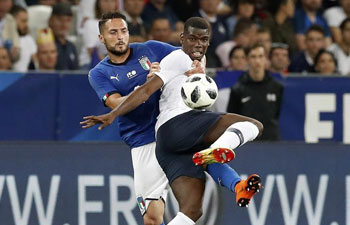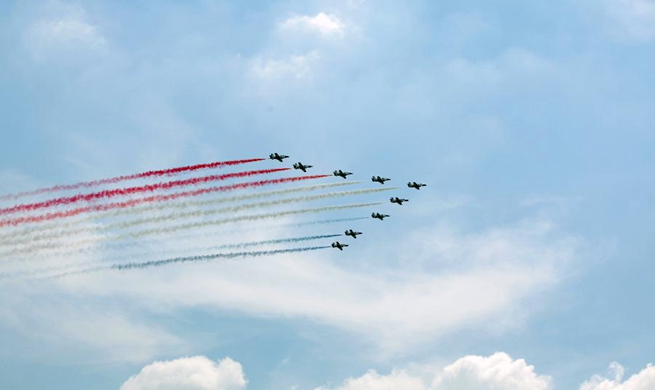by Marwa Yahya
CAIRO, June 2 (Xinhua) -- As the first anniversary of the embargo on Qatar by the Saudi Arabia-led quartet approaches, no side seems to be ready to make any significant concession and end the rift.
The embargo was launched on June 5, 2017, with Saudi Arabia, the United Arab Emirates (UAE), Bahrain, and Egypt cutting all economic and diplomatic ties with Qatar while accusing it of supporting terrorism.
MEDIATION NOT EASY
Regional efforts, led by Kuwait, to resolve the dispute continue. Recently, the Kuwaiti Emir Sheikh Sabah Al Ahmad Al Jaber Al Sabah has sent envoys with letters to the leaders of Qatar, Oman and the UAE, but there has been no sign of new development of the mediation.
"Our mediation has not been easy," said Kuwait's Ambassador to Britain Khaled al Duwaisan, speaking at the annual Oxford Gulf and Arabian Peninsula Studies Forum on May 12, while adding that "the issues can and should be settled by negotiations."
"None of the parties have a real reason right now to make major concessions. The crisis has reached a sort of modus vivendi while the region is busier with other serious conflicts," Rory Miller, professor of international relations with Georgetown University in Qatar, told Xinhua.
One of the major drivers of compromise in the past was cohabitation inside the Gulf Cooperation Council (GCC), Miller said, predicting it is highly unlikely that the GCC is going to play that function any more and therefore there is less incentive to find ways to come to terms.
Furthermore, he argued that the lack of trust and alienation generated over the last year need to be overcome or at least reduced by real and lasting solutions, rather than a token one for public consumption.
The past year has witnessed major financial losses, a fierce media war, and pressing political, economic and social repercussions.
"There was an initial financial shock in the first months, but the impact of the embargo was not that severe on the Qatari economy as we might have thought," Miller said.
Qatar Airways suffered a massive loss because of restrictions imposed by the quartet, said its CEO in March, pointing out that switching to longer routes using wide-body aircraft is driving up costs.
Also, Qatar Airways has been denied entry to airspace over the countries that imposed the blockade, causing diversions that extend flying time and increase the fuel bill.
However, Qatar repositioned its trading relations and networks and refocused on domestic production to make up for gaps in supply and to underpin future food security, Miller added.
Although Qatar has made some achievement so as to dismiss the demands of the Arab quartet, it would lead Qatar to crisis in the long run, said Nourhan el-Sheikh, professor of political science at Cairo University.
"Such a choice requires Doha to endure drain of its money supply and to keep a vigilant eye on the internal mood of its tribal religious community," Sheikh told Xinhua.
Therefore, it is inevitable for Qatar to admit that resolving the crisis and restoring ties with its Gulf neighbors is the best choice, he highlighted.
On the other hand, there is also little sign of willingness to step back by the four countries that severed ties with Qatar.
Saudi Foreign Minister Adel al Jubeir described the Qatari crisis as "very small" compared with other challenges in the region, suggesting Riyadh is content to let it simmer away.
OUTSIDE PRESSURE NEEDED TO PUSH NEGOTIATION
Over the past 25 years, Qatar has intensified its capabilities in networking with and gambling on groups of political Islam in the region, professor Sheikh pointed out.
In 2013, both Saudi Arabia and the UAE confronted Doha's growing influence in Egypt, Libya, Tunisia and Syria.
"It is difficult for Egypt now to make any compromises with Qatar, especially when the latter has close ties with Turkey for supporting the outlawed Muslim Brotherhood group," Sheikh added.
Despite the U.S. silence about the Saudi-led boycott at the beginning, Washington pushes now for a resolution.
Secretary of State Mike Pompeo had a phone call with Qatar's Foreign Minister Sheikh Mohammed bin Abdulrahman Al Thani on May 16, in which he emphasized U.S. President Donald Trump's "desire to see the Gulf dispute eased and eventually resolved."
Earlier last month, Trump announced he was pulling the United States out of the Iran nuclear deal and reimposing sanctions on Tehran.
Saudi Arabia, the UAE and Bahrain supported the decision, but Qatar has opposed the U.S. government's new stance, fearing it would compromise a large offshore gas field jointly-owned by Qatar and Iran.
Nevertheless, the United States would find the region slightly easier to deal with if the Qatar dispute was solved, Sheikh reiterated.
QATARI-IRANIAN-TURKISH RAPPROCHEMENT ADDS MORE COMPLICATIONS
Last November, Qatar signed an agreement with Turkey and Iran to increase the imports of goods to the Gulf state, a move that many consider would offset the quartet's embargo.
"The triangle relation has helped Qatar make up for the economic, political and security isolation caused by the blockade," Miller said.
Last week, Qatar has ordered shops to remove goods imported from the quartet countries.
The products were replaced by commodities from Turkey, Iran and other countries.
However, Miller noted that building up ties with Turkey and Iran may not be a perfect substitute for the downgrading relations with the GCC partners, and the Arab countries are not willing to see such a boost in ties between Qatar and Iran.
"Saudi, which leads a coalition in Yemen to fight Iran-supported Houthis, also couldn't easily accept any compromises with Qatar that is betting on Tehran's support," he said.
Egypt has accused Qatar and Turkey of sheltering members of terrorist organizations that sought instability of Egypt as well as intervention in Cairo's internal affairs.

















